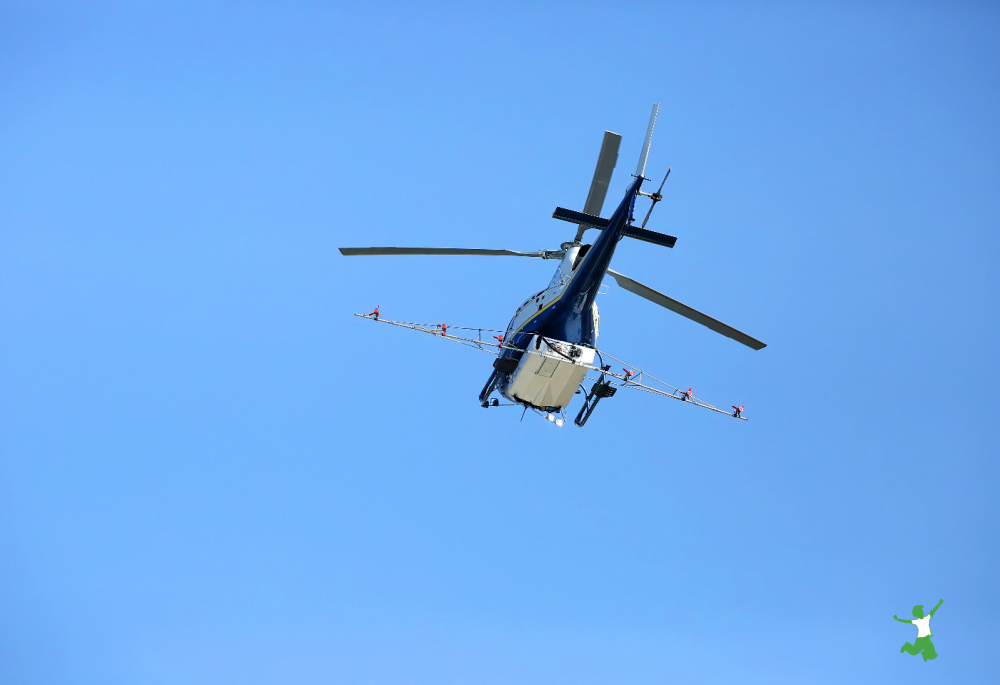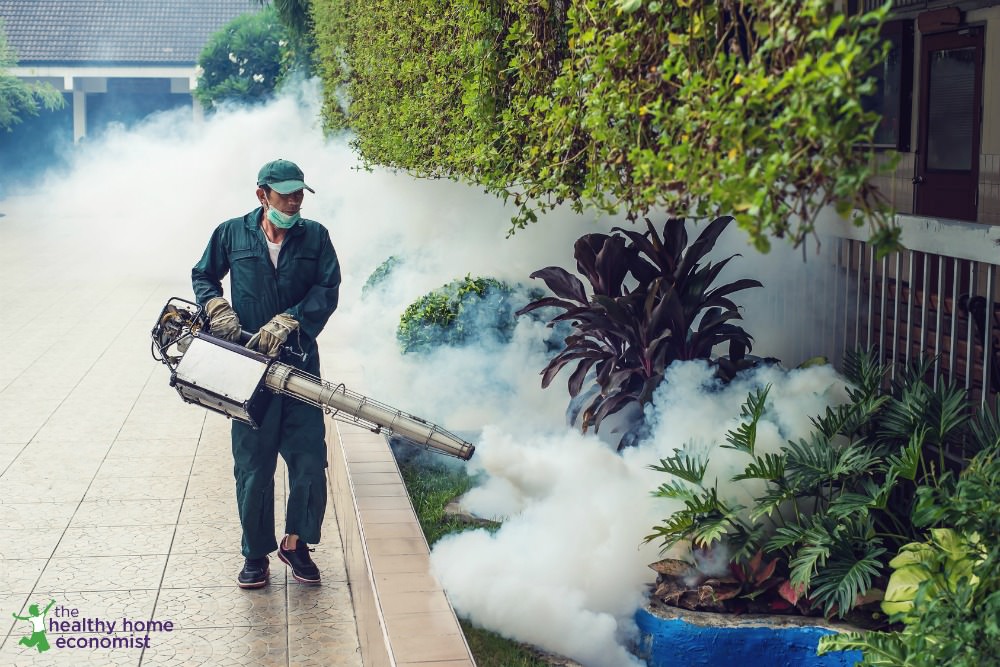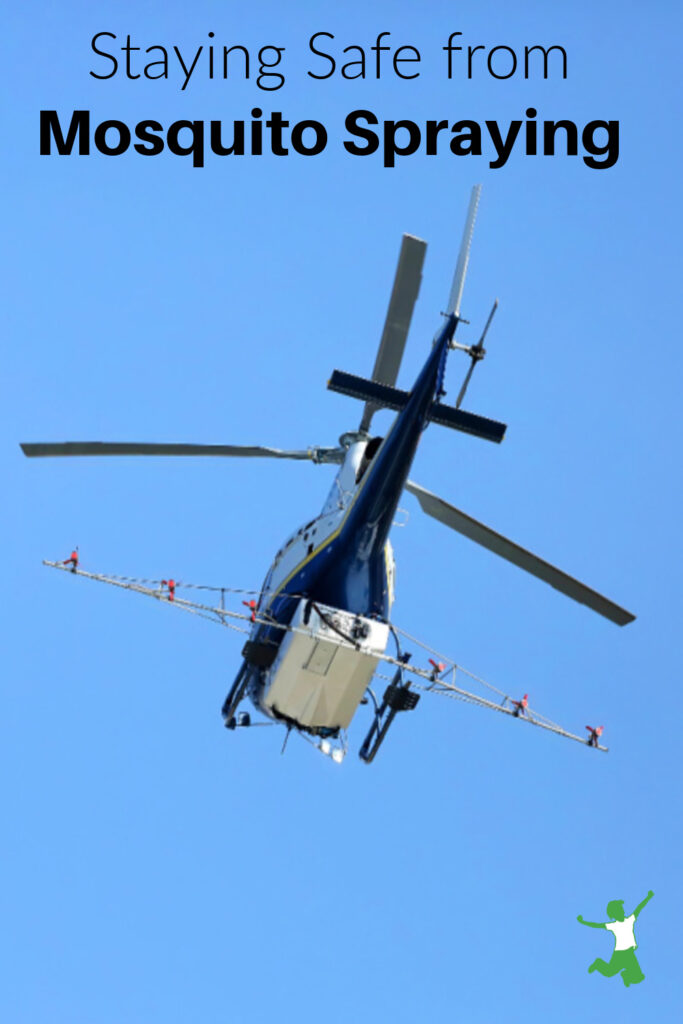Table of Contents[Hide][Show]
- Where Mosquito Spraying Occurs
- Are Fogging Chemicals Safe?
- Naled: Safe or Not?
- Other Mosquito Control Chemicals
- How to Protect Yourself from Mosquito Spraying
- Live as Far Away from the Road as Possible
- Contact Local Government
- Get on Mosquito Control’s Contact List
- Keep Windows and Doors Closed
- Keep Pets Indoors
- Cover Your Vegetable Garden
- Outdoor Recreation
- Chemical-free Mosquito Control
How to protect your family, pets, livestock, and garden from municipal government programs that spray neighborhoods for mosquitoes by truck, drone, helicopter, or plane.

Mosquito spraying is one of the primary tools local governments use to quickly reduce the number of mosquitoes in a community.
Typically, fogging efforts target the species responsible for infecting people with viruses like Zika, West Nile, dengue, or chikungunya.
In my community, they just started back up spraying due to a single case of dengue fever in my county! Talk about an overreaction!
Some communities implement fogging programs to reduce mosquito populations strictly to support local tourism.
Fewer mosquito bites during a beachside or Disney World vacation means a higher likelihood visitors will come back for another holiday!
Mosquito control workers dispense pesticides and larvacides either on foot or via fogging trucks, planes, drones, or low-flying helicopters.
In a county north of where I live, orange choppers commonly use sharp maneuvers known as “AG turns” to enter and exit a treatment zone. This can be quite alarming to residents.
Where Mosquito Spraying Occurs
Many densely populated areas spray for mosquitoes, often without input or knowledge of residents.
In 2016, Florida quietly reversed 29 years of policy against aerial spraying at amusement parks. The decision was made without any opportunity for citizens to comment. (1)
Living in colder locations is no protection from the potential onslaught.
Staten Island, New York, the Canadian city of Winnipeg and many other non-tropical urban locations utilize mosquito spraying periodically as well.
Warmer locations plagued with high mosquito populations may routinely spray year-round based on the number of mosquitoes inspectors find in traps, the types of mosquitoes that are proliferating, and/or landing rate counts.
The bottom line is that every community is slightly different in the implementation of local mosquito control policies.
Whatever “public health” strategy is decided, residents have little to no say in its implementation.
Are Fogging Chemicals Safe?
Local governments have a number of different mosquito fogging chemicals at their disposal when implementing a mosquito control program.
Naled is one of the most popular insecticides for this purpose. Authorities including the CDC insist that naled and other chemicals are safe.
Such assurances ring hollow with a public that has heard that song and dance before.
DDT used to be considered safe for mosquito spraying too.
In the mid-late 1950s, children used to run, bike, or skate behind trucks fogging areas with DDT.
Children thought it was fun to play in the thick chemical fog as vehicles slowly drove around residential streets right after dinnertime.
The government assured citizens DDT was safe. Schools even hung posters showing workers spraying school lunchroom food to show that there was no danger. (2)
Of course, DDT was perfectly safe, until it suddenly wasn’t. The chemical was banned in 1972 by the EPA due to the health risks to humans, wildlife, and the environment.
Naled: Safe or Not?
Naled has by and large taken the place of DDT for mosquito control purposes.
According to the CDC, the chemical is safe based on a decades-long history of use. (3)
- Since the 1950s, naled has been extensively applied via aerial and ground spraying on an average of approximately 16 million acres of the continental United States annually.
- Naled is the chemical of choice for mosquito control following natural disasters, such as hurricanes and floods.
- In 2004 and 2005, local authorities used naled as part of the emergency responses to Hurricanes Charley, Jeanne, Frances, and Katrina.
- Naled is currently used in many places in the United States, including the Florida Keys, Lee County, and Miami-Dade County.
- Puerto Rico uses naled to control mosquito species that spread dengue.
The Environmental Protection Agency (EPA) also insists Naled is safe.
When applied according to label instructions, EPA does not expect the use of naled for public health mosquito control to raise a human health concern. People are unlikely to breathe in amounts large enough or touch anything with enough insecticide on it to harm them. However, anyone who is concerned because of an existing health problem should talk to their doctor. Also, people who tend to be sensitive to chemicals in general, including household chemicals, could experience short-term effects, such as skin, eye, and nose irritation. Contact your local mosquito control program to get specific information on spraying in your area. (4)
Scientific research to date indicates that naled is low toxicity as well.
The Journal of the American Mosquito Control Association published results of a study in 2008 which concluded that “data suggest that aerial spraying of naled does not result in increased levels of naled in humans, provided the naled is used according to label instructions”. (5)
Other Mosquito Control Chemicals
While naled is commonly used for mosquito spraying, a number of other pesticides are popular as well. What is used depends on mosquito resistance and other factors.
Common choices are Etofenprox (brand name Zenivex) and permethrin (brand names such as Scourge and Anvil).
Manufacturers of both insecticides claim low toxicity to birds. Once the spray has dried, the chemicals are apparently “harmless” to bats, bees, and pets too.
The safety data sheets for these products suggest that the truth is much more complicated. (6, 7)
Are the local governments using these insecticides downplaying the health risks to gain public compliance? It would seem so, at least to me!
Unfortunately, mosquito fogging efforts don’t just involve insecticides.
Usually, a pesticide that targets adult mosquitoes is paired with a larvacide to eliminate emerging insects as well.
Most local governments utilize a blend of insecticides and/or larvacides that are situation-specific.
Hence, a fogging truck may spray one set of chemicals during one season of the year and another after a heavy rain event.
To find out what is sprayed in your area, you must contact the mosquito control authorities in your community.
The synergistic toxicity of blended chemicals is one of the most concerning health risks of mosquito spraying. This is because manufacturers and/or governments almost never test the biological effects of chemical cocktails.
Thus, residents end up being guinea pigs just like back in the DDT spraying days.
How to Protect Yourself from Mosquito Spraying
Ultimately, if your local authorities decide to implement a mosquito spraying program either on foot, truck, or aerially, there is little to nothing you can do about it.
With that in mind, there are certainly a number of things you can do to minimize any long-term health effects.

Live as Far Away from the Road as Possible
If you are in the market for a new house, condo, or apartment, try to find one that is located as far off the street as possible. 300 feet (100 yards) or more is ideal.
In some places, fogging trucks do not spray in gated communities as they can’t easily get access.
Living in an exclusive community doesn’t completely put you in the clear, however.
Wealthy but clueless homeowners may install automatic mosquito foggers themselves around pools, porches, and decks. This puts neighbors in close proximity at risk.
Of course, if aerial spraying occurs in your area, living away from the street won’t do much good!
Contact Local Government
A very important step to protecting yourself is knowing exactly when spraying is to occur.
To obtain this information, you must contact the local government in your area.
For some, this will be a municipal authority, for others, a county or parish.
If there isn’t any mosquito control department, you are in the clear.
If such a program exists, find out as much detail about local spraying efforts as you can.
Get on Mosquito Control’s Contact List
Most local mosquito control programs offer a way for residents to be contacted before spraying occurs in their neighborhood.
Usually, contact via email or a text to your phone number gives you a 24-48 hour heads up that spraying on your street is imminent.
Keep Windows and Doors Closed
It goes without saying that doors and windows (including the garage) should be closed during spraying. Usually, spraying occurs at night when mosquitoes are at their peak activity.
You may need to resign yourself to using the A/C or fans on those nights if outdoor temperatures are warm.
I would suggest keeping doors and windows closed at least for the first few hours after sunrise the following day too.
Naled, for example, breaks down rapidly with exposure to sunlight.
Keep Pets Indoors
Bring your pets indoors on nights when spraying is to occur. Walk the dog before sundown as the trucks usually start their route about 9 pm and finish after midnight.
If you have chickens, beehives, or other outdoor animals, keep them in the backyard.
My neighbor once lost a beehive that was in the front yard when the fogging truck came around. It wasn’t even that close to the road!
Be sure to temporarily cover ornamental fishponds before the spraying starts.
Cover Your Vegetable Garden
If you grow your own produce, cover the area on nights when spraying occurs.
Follow the same process for nights when a frost is expected.
Outdoor Recreation
It goes without saying to keep children indoors during spraying times.
It is best to avoid jogging, walking, or biking in the neighborhood after dinnertime too when spraying is on the schedule.
In addition, skipping outdoor recreation the morning after spraying is a good idea too.
This gives ample time for the pesticides to come into contact with sunlight which dries and/or degrades them rapidly.
Chemical-free Mosquito Control
If you are considering fogging equipment for your home, I would suggest taking a look at another method. And no, it doesn’t involve planting citronella all around your house! That does not work!
The most effective way to get rid of mosquitoes without any pesticides is BY FAR the Dyno-Trap.
There are 3 models to choose from depending on the size of your property.
These devices very effectively attract and trap mosquitoes without any zapping sounds.
In fact, they are almost completely noiseless.
While these devices only trap adult mosquitoes, within a few weeks, the life cycle of mozzies in the immediate area is broken, resulting in a drastic reduction in the number near your home.
I can personally attest that the Dyno-Trap works even when you’ve had an enormous amount of rain with swampy areas and puddles everywhere!
Another suggestion is to add a bat house to your property.
The only downside is that you will need to wait until the bats find it and move in before you start seeing a reduction in mosquitoes!

(1) Florida parks may be sprayed for mosquitoes
(2) Running Behind the DDT Truck
(3) CDC: Information on Aerial Spraying
(4) EPA: Naled for Mosquito Control
(5) Community aerial mosquito control and naled exposure
(6) Zenivex Safety Data Sheet
(7) Scourge Safety Data Sheet
More Information








Thank you! Do you have a similar post on commercial lawn fertilizer/pesticide companies. Many in our development spray and the smell is so strong. I would love to know how to educate the neighbors and or protect myself and my ‘organic’ vegetable garden.
I don’t have any suggestions on that sticky issue. Many homeowners associations require a perfect or close to perfect lawn otherwise you get a nasty letter or worse. This encourages the use of lots of chemicals which is sad. I would suggest talking with your neighbors to suggest trying one of the green lawncare companies that are popping up all over the country as alternatives. They don’t use chemical fertilizers or pesticides and they are getting great results in my area!
Wondering about the Dyno-Trap. I read somewhere that many mosquito traps will kill adult mosquitoes, but also kill many beneficial insects as well. What about the Dyno-Trap?
The Dyno-trap does not harm bees! Yay!